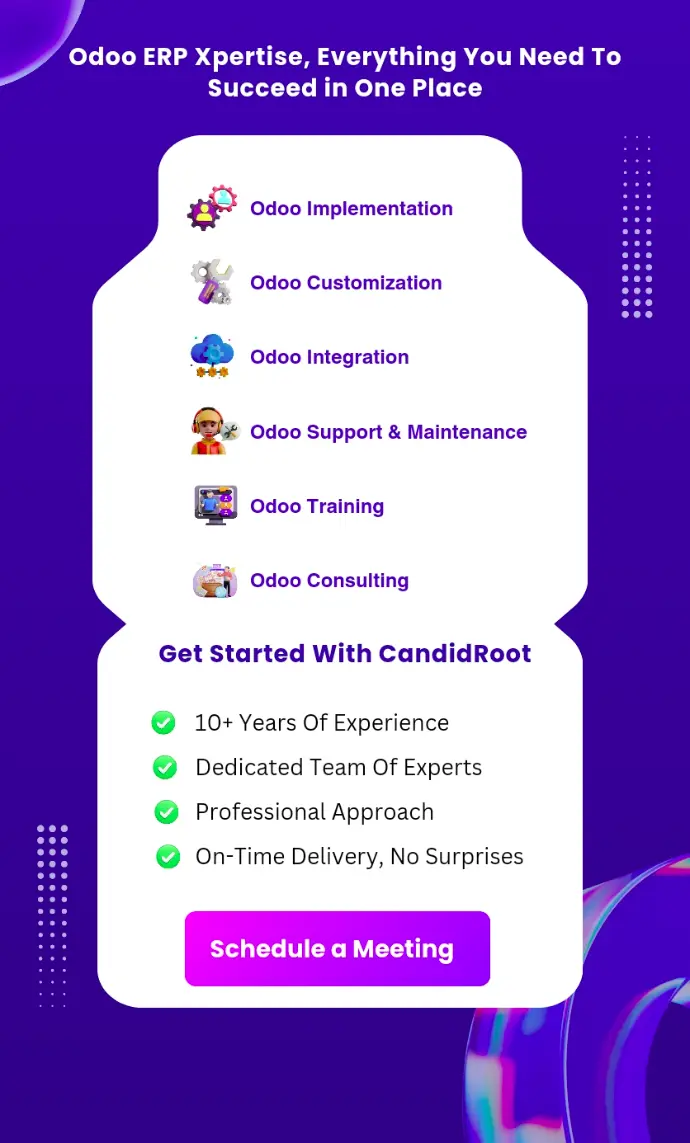Implementing Odoo ERP for your small business can be a smart decision, as it will streamline operations and boost the productivity of Odoo business apps.
Odoo is a robust ERP system designed to help small and medium-sized businesses. It manages everything from inventory to sales to accounting and HR on one platform.
Importance of Odoo ERP Implementation
Centralized Business Management
One main reason businesses choose Odoo ERP implementation services is to centralize all operations in a single system. If you are dealing with several disparate software tools, you can consider implementing the Odoo ERP system. Because Odoo consolidates everything in one place. It provides you with an extensive view of operations. This centralized management leads to;
- Improved data accuracy
- Faster decision-making
- Enhanced productivity
Streamlined Business Processes
Are you looking to integrate key business functions into a single system? You can implement the Odoo ERP solution which enables companies to make their processes smoother. For example, automated inventory tracking ensures real-time data synchronization which reduces errors and delays. Similarly, accounting and invoicing processes have become faster and more accurate which has led to better financial management.
Cost Savings
Implementing Odoo ERP can also reduce operational costs. Searching for solutions to eliminate the need for multiple software licenses and integrations? Consider implementing the Odoo ERP system. So you can save money on software and IT maintenance. Moreover, the improved efficiency that comes with Odoo implementation leads to reduced overhead costs in the future.
Scalability
If your business grows, the Odoo can grow with you as well. It has a modular structure to add new functionalities to your needs. If you want to expand your workforce, Odoo ERP implementation ensures that the software can scale with your business.
Improved Collaboration
Departments can collaborate with the Odoo ERP system to access the shared information. This real-time sharing of data leads to better communication across teams. It enables your employees to make better decisions based on updated information. For example, sales teams can access inventory data in real-time. It helps you manage customer expectations and prevent stock-outs.
Better Customer Relationship Management
An important advantage of Odoo ERP implementation is its CRM module. This allows you to
- Manage customer relationships
- Track leads
- Follow up with prospects
- Close more sales
It collects customer information in a single place so it is easy for you to provide personalized services.
Steps to Odoo ERP Implementation for a Small Business
Below are the steps for Odoo ERP implementation for your small business.
Assess Your Business Needs
First, understand your business requirements and then move forward with Odoo business implementation.
How will enhanced efficiency benefit your business? Check all the inventory management issues. Is there any requirement for tracking better customer relationships?
Knowing what difficulties you would like to address allows you to identify which Odoo modules will provide the greatest value.
Consider questions like:
- Are we having trouble managing our customer relationships?
- Does our inventory management system have errors, or is it out of date?
- Could we simplify our accounting processes?
- Answering these questions allows you to choose which Odoo modules—such as CRM, Sales, Inventory, or Accounting—to focus on first.
Choose Between Odoo Community and Odoo Enterprise
Odoo business solutions come in two versions: Odoo Community and Odoo Enterprise, both are good, but the free version may offer more than enough functionality.
Yet Odoo Enterprise can be worth the cost if your company needs sophisticated capabilities like extensive support, mobile integration, or more sophisticated financial tools.
Start with the Community edition if the budget is tight and upgrade as your company expands. Odoo Enterprise might be the best solution from the outset for companies seeking a wider selection of tools and customization choices.
Plan Your Implementation Process
Without a clear plan, the Odoo implementation process can become disorganized. It would be helpful to have a clear roadmap outlining deadlines, resources, and milestones. Decide whether you want to conduct the implementation internally or employ an Odoo implementation partner to speed up the process.
While Odoo provides lessons and substantial documentation, working with a partner may save you time and eliminate obstacles along the road.
Pick the Right Modules for Your Business
You can select just the capabilities you require with Odoo thanks to its modular design. This is particularly advantageous for small enterprises that intend to launch modestly and grow over time.
Some of the most popular modules in Odoo for small businesses include:
- Sales: From leads to opportunities to completing deals, manage your sales funnel.
- CRM: arrange and improve interactions with customers.
- Accounting: Automate billing, payment processing, and financial reporting.
- Inventory: Keep a check on your inventory, suppliers, and orders.
- Human Resources: Manage staff attendance and payroll.
- Begin with the key components that handle your company's pain concerns, then add additional as your requirements evolve.
Migrate Your Data
One of the most challenging aspects of implementing an ERP is frequent data migration. Data about sales, inventory, customers, and finances must be transferred into Odoo. As much organization and cleanliness as possible in your data will help to create a seamless procedure.
Odoo has built-in features to assist with data migration, but if you're switching from another program or a legacy system, you may want professional assistance from an Odoo migration company.
Customize and Configure Odoo for Your Business
Odoo's adaptability is one of its benefits. The solution is adaptable to your unique company procedures and workflows. Odoo may be customized to meet your needs, whether that means adding custom fields, changing report formats, or defining unique user roles.
To prevent any misconfigurations, you may wish to work with a developer or an Odoo customization partner, depending on the intricacy of the modification.
Train Your Team
Using Odoo effectively requires more than just the program; it also requires your team to work together. Ensure that your staff members are competent and at ease with the new system.
Although Odoo has a ton of tutorials and documentation, in-person training sessions may help make sure that everyone is proficient with the tools.
Test the system before going live.
Thoroughly test Odoo before using it daily. Run through normal procedures to ensure everything is working properly and to discover any problems or inefficiencies.
Testing is critical for detecting errors, fixing difficulties, and ensuring that all integrated parts perform seamlessly.
Launch and Monitor Performance
When everything checks out, it's time to go live with Odoo. However, this is not the conclusion of the process.
Continue to monitor the system's performance and seek feedback from your team to ensure it is reaching your objectives.
Odoo's modular design makes it simple to add features as your company grows and to modify the system over time.
Implementing Odoo in a small firm can be a huge benefit, improving operational efficiency and automating numerous routine chores.
You can guarantee a seamless transition and position your company for success by implementing the system with care and attention, starting with assessing your needs, choosing the appropriate modules, educating your staff, and personalizing the interface.


